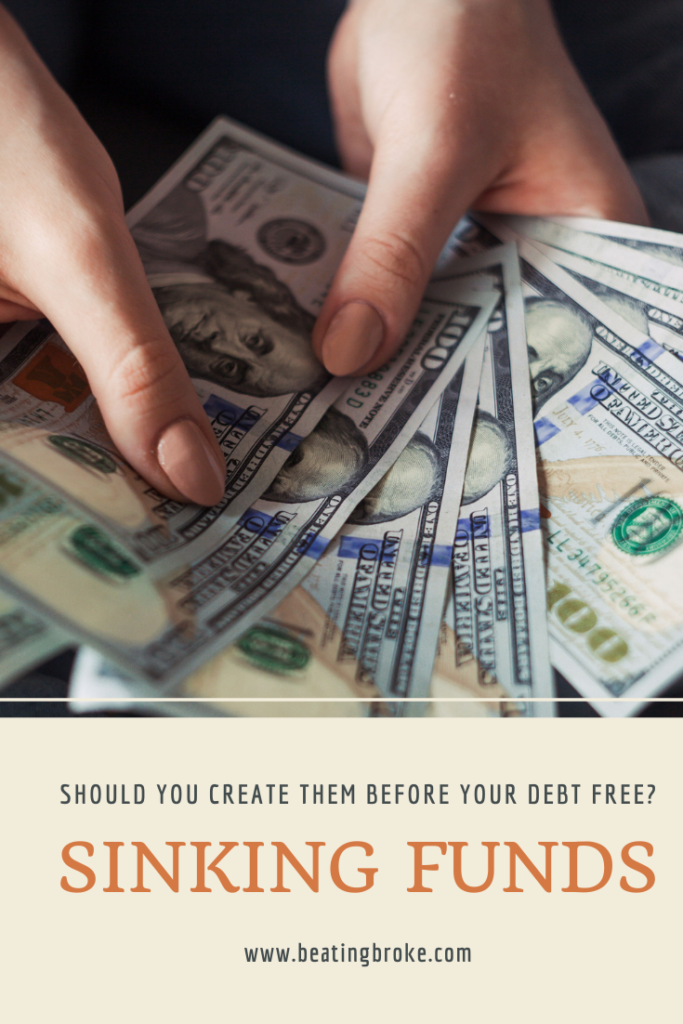You have debt. A lot of debt. And now you want to pay it off, IMMEDIATELY! You’re fired up. You’ve read financial blogs, read debt payoff gurus books, and you’re setting up your budget. Should you create sinking funds before your debt free or put all of your money toward debt repayment?
What Are Sinking Funds?
If you’re new to budgeting, sinking funds are money you put aside for irregular expenses you know will come up during the year. Let’s say you spend $1,000 each Christmas, so you decide, in January, to set aside $83 a month in your Christmas sinking fund. When December rolls around, you have all of the money you need to pay for your Christmas gifts debt free.

The Argument Against Sinking Funds
Some argue that you shouldn’t set up sinking funds until you’re debt free. What is the point of putting $83 aside for Christmas when you’re paying 15% interest on your credit card? That $83 each month would be better served if you applied it to your credit card and reduced the balance and therefore the amount you’re paying in interest. You’ll get out of debt more quickly this way.
The Flaw With This Kind of Thinking
There is one major flaw with this kind of thinking. What will you do when you need to actually pay one of these irregular expenses?
I live in Arizona, and six months of the year, my air conditioner runs night and day. During those months, my electric bill ranges from $225 to $275, depending on how warm it is outside. Then there are about two months a year in flux when the electric is $125 to $175, and, in the winter, for four months, my electric settles down to $80 a month.
My budget can’t handle such big fluctuations in our electric bill, so every month, I set aside $150 for electric. When summer comes, I have a large sinking fund to help me pay for those hot months when the electric bill will be much higher than $150.
If I didn’t have a sinking fund, how would I pay for the high electric bill in July?
A Happy Compromise
I encourage everyone to set up sinking funds, even if you do have lots of debt. Part of getting out of debt (and staying out of debt) is changing your attitude toward money. What’s the use of putting all of your money on your debt if you have a $1,500 car repair, no money set aside, and you have to charge it and go further back in debt again? That’s not a budget roller coaster I want to be on.
But there is a compromise; if you have extra in the sinking fund after the event is over, apply that money to debt. For instance, let’s go back to the sinking fund of $1,000 at Christmas. Let’s say you’re conservative, shop the deals, and only end up spending $750 on Christmas presents. Great! Take that leftover $250 and apply it to debt. Then, in January start saving for the sinking fund again.
If you’re paying down debt, make sure to create and fund sinking funds. You won’t be sorry, and you’ll be changing your attitude toward money so when you get out of debt, you stay out of debt.
Do you create and fund sinking funds each month? If not, how do you handle it when large, unplanned or irregular expenses come up?
Melissa is a writer and virtual assistant. She earned her Master’s from Southern Illinois University, and her Bachelor’s in English from the University of Michigan. When she’s not working, you can find her homeschooling her kids, reading a good book, or cooking. She resides in New York, where she loves the natural beauty of the area.



You’re article explains logically what I’ve sensed intuitively for a while now. For me, getting out of debt is important, but is only one area of an effective financial strategy. Sink funds do exactly what you explained, they help keep me from running up credit in an emergency, and help me to decide what I really want as well. I would add that i believe some of the worst investment advice I’ve ever received was to wait and invest after paying off all debt. I mean, who does that? I would have no investments at all if I still did that. Thankfully, I have a retirement account so that I’ll have money later on. Credit cards can be tempting and can lead to financial ruin when not used property, and I’ve found myself over my head at times. However,. learning to balance debt, savings, and investing has been a much more powerful strategy for me. I’ve paid off debt with the profits from certain investments as well, helping raise my credit score and allow me to receive better rates.